The term “social distancing” initially was popularized at the onset of the COVID-19 outbreak to encourage us to do our part in stopping the spread of the virus by staying at home and avoiding group gatherings.
However, many are realizing that community and connection are needed more than ever in these times and that the “distance” we should maintain is only physical. The World Health Organization has even transitioned to using the term “physical distancing” in its official communications to emphasize this point.
As people slowly begin to find their new normal, small businesses feeling the effects of physical distancing are discovering ways to adapt by doubling down on social connections and community.
We spoke to six independent businesses—from an Italian shoemaker to a Canadian fitness studio—who are trying to make sense of the current situation while starting new initiatives that offer a sense of belonging and normalcy to others during this time.
Thinking outside the shoebox
Enrico Casati and Jacopo Sebastio cofounded Velasca, one of Italy’s first direct-to-consumer brands in 2013, when they saw a gap in the market between fast fashion and designer handmade shoes. Since then, they’ve been able to build a business model that eliminates the layers of distributors, resellers, and retailers, to bring handcrafted footwear directly to the everyday consumer. They’ve scaled their business to service over 30 countries, selling more than 100,000 pairs of shoes, and launched 10 retail stores throughout Europe.

In late 2019, Enrico shared his journey on我们Shopify大师播客, discussing Velasca’s launch during an economic recession, its expansion from online to retail, and its dedication to compelling storytelling.
Today, Velasca is operating in a very different reality. Headquartered in one of the epicenters of the COVID-19 outbreak, the company was faced with a series of drastic changes. Its retail stores had to close, and employees had to switch to working remotely.
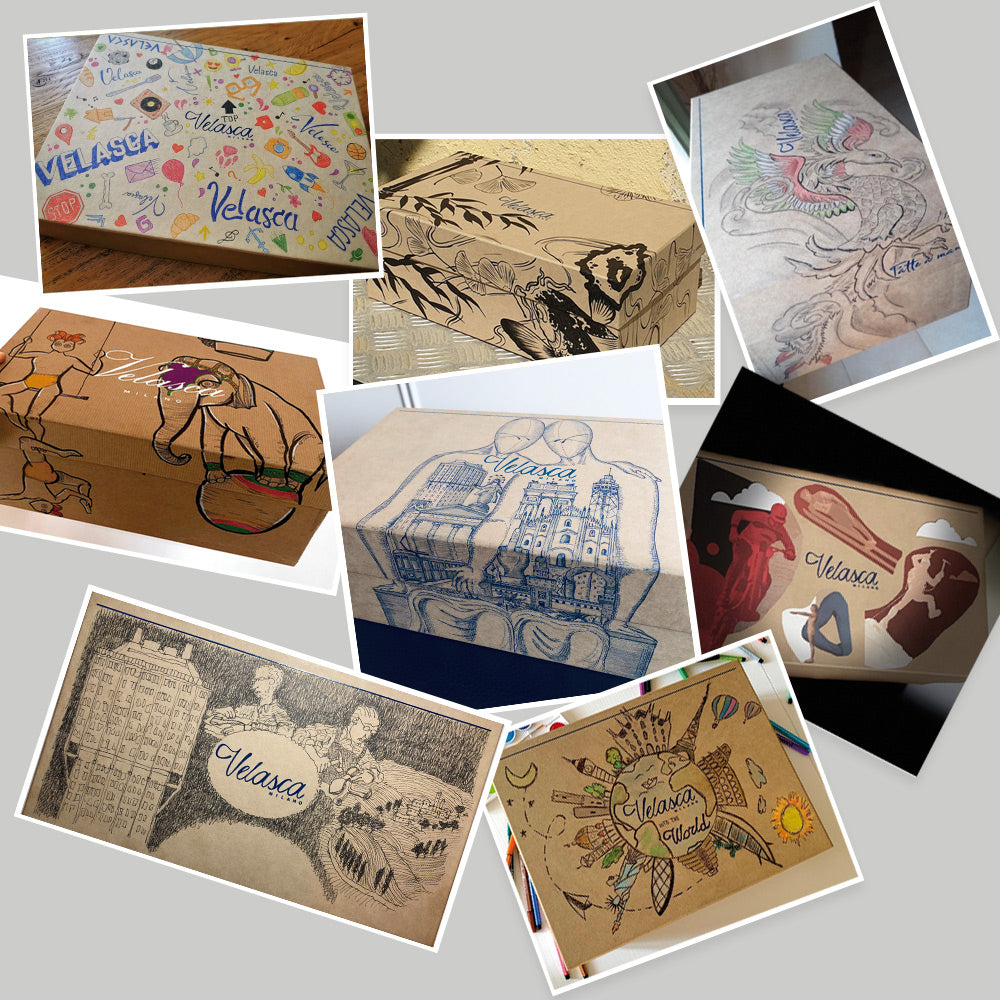
But despite these unexpected disruptions, Velasca managed to stay true to one of its core values: telling stories that connect with its community. In early March, the Velasca team was inspired by a customer who sent them a shoebox their son had created a unique design on. “It was a real masterpiece,” Enrico says. The team decided to start the#ValascaBoxChallengeand asked their community to draw, paint, and create on Velasca shoeboxes—and to cast votes for their favorite design. The four boxes with the most votes will be recreated on limited edition Velasca boxes.
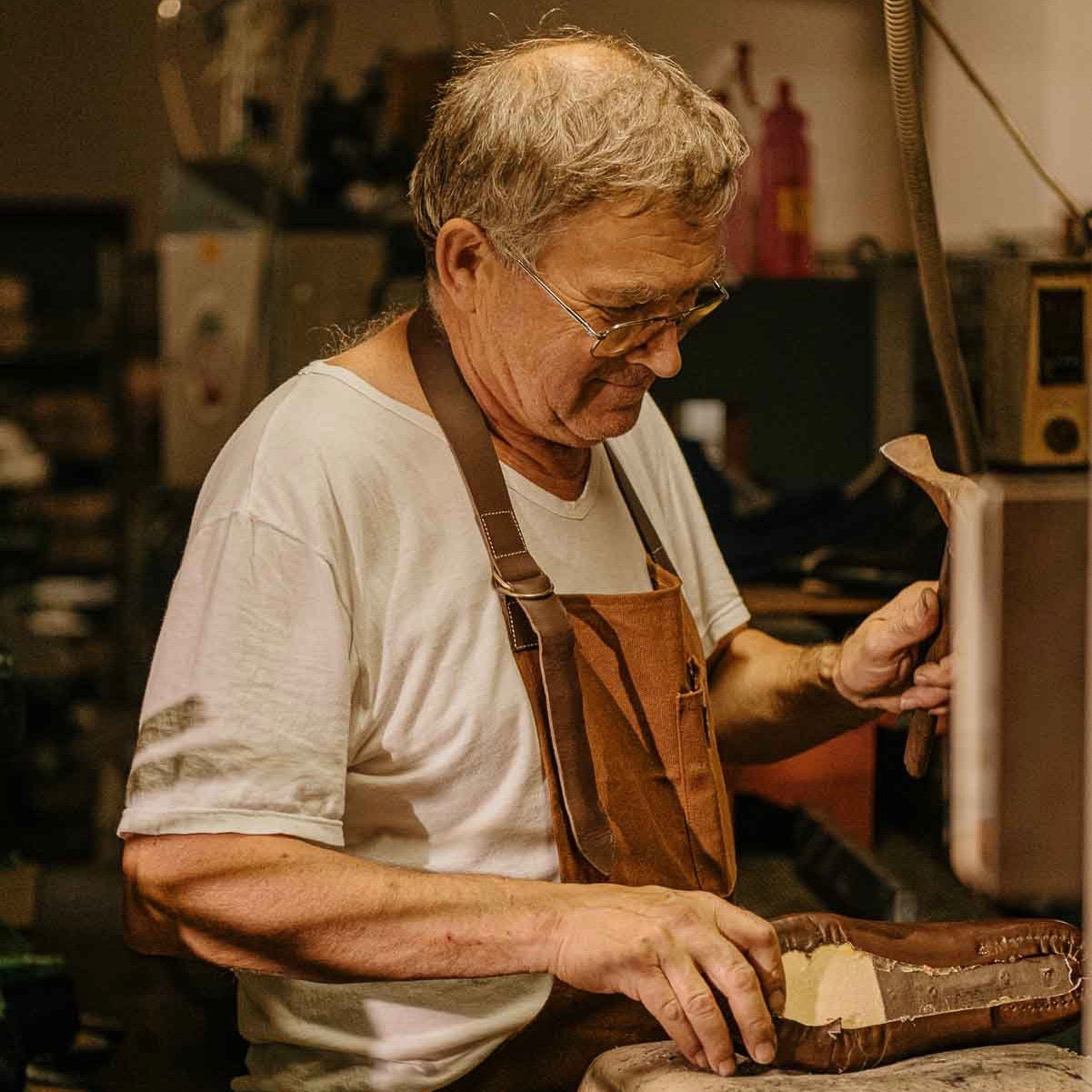
Velasca’s team uses the company’sInstagram account分享他们的远程工作设置和新发现的滚刀bies, along with useful tips like how to polish leather shoes. Their marketing efforts don’t push the sale of shoes or have any call to action. Instead, they put the shoemakers at the forefront, showcasing their stories, family backgrounds, and even their favorite pasta dishes. The team provides a sense of community through beautiful visuals, approachable storytelling, and editorialized content, all while navigating this new set of unknowns.
Bringing movement online while merchandising
Located on the trendy Ossington strip in downtown Toronto,Misfitstudiois dedicated to creating a sense of community through physical movement. Typically, the studio offers classes that place an emphasis on how movements make the participants feel, from pilates mixed with yoga to dance inspired by ballet and jazz to medication and postnatal classes.

Misfitstudio was one of the first fitness studios in Toronto to close its doors in response to the COVID-19 crisis. “My teachers were starting to say that they felt like they were putting themselves at risk,” says founder Amber Joliat. “They are the most important thing to me, and if they were feeling at all unsafe then it’s not worth it.”
数码类不a new concept for Misfitstudio—video subscriptionhas been one of its offerings for almost five years. It originally was intended for those who used to frequent the studio but had moved away from Toronto. Now, the studio also offerslive-streamed classes, providing a sense of community for regulars who prefer to work out in a group.

与更广泛的社区,the studio is also offering free classes through Instagram Live, letting anyone who wants to add some movement to their day join in at home. It also shares deep conversations on mental health, grief, transformation, and other intricacies of life on its podcast,Be Moved with Misfitstudio.
This sense of community is at the heart of what Amber and her teachers have always strived to achieve. It’s no wonder those who frequent Misfit still wanted to represent the studio when they moved their workouts into their homes: brandedmerchandiseavailable on the studio’s website sold out during the initial weeks of March.
Feeding and supporting the hospitality industry
Sqirlhas a reputation as a must-visit spot for breakfast or lunch, even outside its home city of Los Angeles. Chef and owner Jessica Koslow captures the essence and highlights the nuances of local seasonal fruits in small-batch artisanal jams—something that catapulted her culinary reputation.
Before the outbreak, the perimeter of Sqirl would be wrapped with lines of patient patrons awaiting a seat to enjoy Jessica’s famed ricotta toast, sorrel pesto rice bowl, or flat tots. But the hospitality industry has been one of the most heavily impacted by COVID-19, and Sqirl is now closed to the public.
But the restaurant has adapted to its new situation, taking on many new projects, including selling jams—something that harkens back to Jessica’s roots, as she did this before starting the restaurant. “I’m really grateful that there is this physical product because it’s keeping us alive,” says Jessica.

As the Sqirl team transitioned toonlinesales of its jams, coffee, and merchandise, the team’s most important goal is helping other individuals within the hospitality industry. “The first initiative we did was Clyde Dye,” Jessica says. “Our employeeClydestarted tie-dying our shirts, and proceeds were shared equally and equitably amongst our cooks and front house staff.” Since then, Sqirl has also sold tie-dyed totes and copies of their cookbooks to maintain health care coverage for its employees.
Moving beyond supporting its own staff, Sqirl also runsFramily Meal, a program offering thousands of meals and essential items at no cost to out-of-work hospitality professionals. Sqirl took over this program on April 4, when its previous organizer, James Beard Award-winning chef Nancy Silverton, tested positive for COVID-19. (She has since recovered.)

Jessica stresses the importance of staying connected to her colleagues within the industry during this time. “None of us know the answer,” says Jessica. “The best thing we can do is collectively talk to each other.”
Sharing knowledge while raising awareness
Liezel Strauss is the cofounder ofSubject Matter, an early online art platform that’s been challenging the exclusive nature of the art world and inspiring new art buyers since 2011.
As an avid supporter and curator of the arts, Liezel was stunned by a campaign run by the National Museum of Women in the Arts (NMWA) that tested individuals to name five female artists. NMWA’s goal was to highlight the fact that only a fraction of women artists are represented in the art world: over the past decade, the top galleries in the United States commissioned only11% of their purchased worksfrom female artists. “I couldn’t get my head around it, because I’m in the art world, and how have I not noticed it?” says Liezel.
An episode of the Netflix showQueer Eyefeaturing star Antoni Porowski in a t-shirt printed with character's names fromA Little Lifeon it inspired Liezel to create her own shirts with the names of women artists on them, under the brandArtGirlUprising. By having a list of five women artists’ names on these shirts, it starts a conversation and gets people to inquire more about the art behind the names. Partial proceeds from the shirts go to organizations likeWomen for Womenand theNational Museum of Women in the Arts.

Liezel wanted to support the art community in new ways during the quarantine. She launched the#ArtGirlsWFHseries of online classes, available as live streams or prerecorded, to help artists learn about the business side of art, community building, and managing homeschooling. The classes also employ artists as teachers.
Despite running the classes at a loss for now, “it’s all about community building and allowing people to see each other,” Liezel says. With virtual coffee sessions and check-ins on social media, ArtGirlUprising is growing its own inclusive online space and allowing artists to hone their craft while physically distancing.
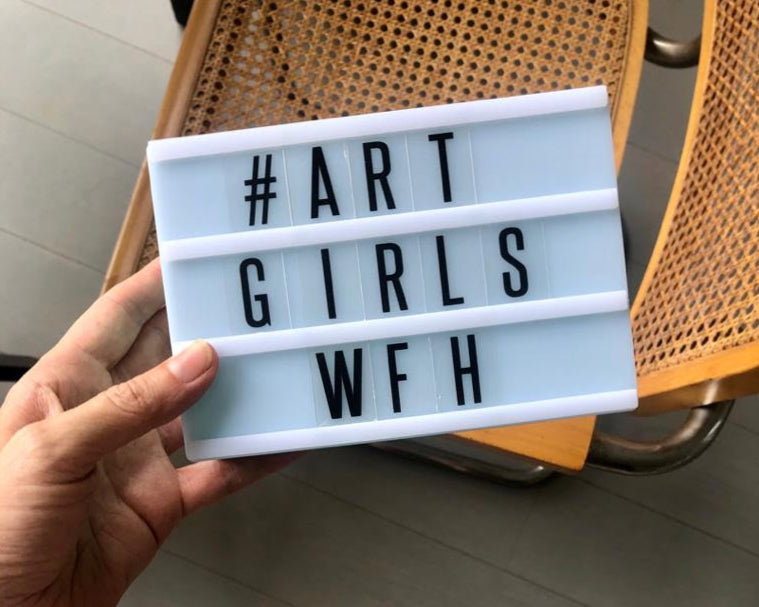
Sparking hope and purpose
Purpose Jewelryis all about sparking hope through handcrafted pieces made by artisans. As the social enterprise ofInternational Sanctuary, Purpose Jewelry employs survivors of human trafficking from International Snacturay by offering income, health care, education, and a sense of community through jewelry making.
With sanctuaries for survivors in Mumbai, Kampala, Tijuana, and Orange County, California, Purpose Jewelry and International Sanctuary are driven by the mission to empower survivors who escape human trafficking. At the beginning of the outbreak, their#SparkOfHopecampaign asked individuals to share on social media what brought them hope.
Beyond social media, the team is also incorporating this campaign into its operations by letting customers send inspiring messages along with the jewelry they are gifting to loved ones.

The team’s main focus now is checking in on the well-being of their network of volunteers. Alexandra Badie, head of communications and community relations, and Deanne Weissman, who looks after partnerships, say their 500 volunteers have shaped and built Purpose Jewelry and International Sanctuary into what they are today, and conversations with this network bring them hope during this time.
An inflection point for growth and connecting through food
How does a bakery experience exponential growth while its doors are closed and everyone is baking at home?
Meet one of the newest merchants on Shopify, Brodflour: a unique eatery based in Toronto. Brodflour, which opened in early 2019, not only bakes everything fresh in-house, it also sources local heritage grains to mill its own flour, which “contains minerals, nutrients, oil, and vitamins that are inherent to the grain but are lost when it’s mass produced and put on store shelves,” says Mattew Faust, Brodflour’s general manager.
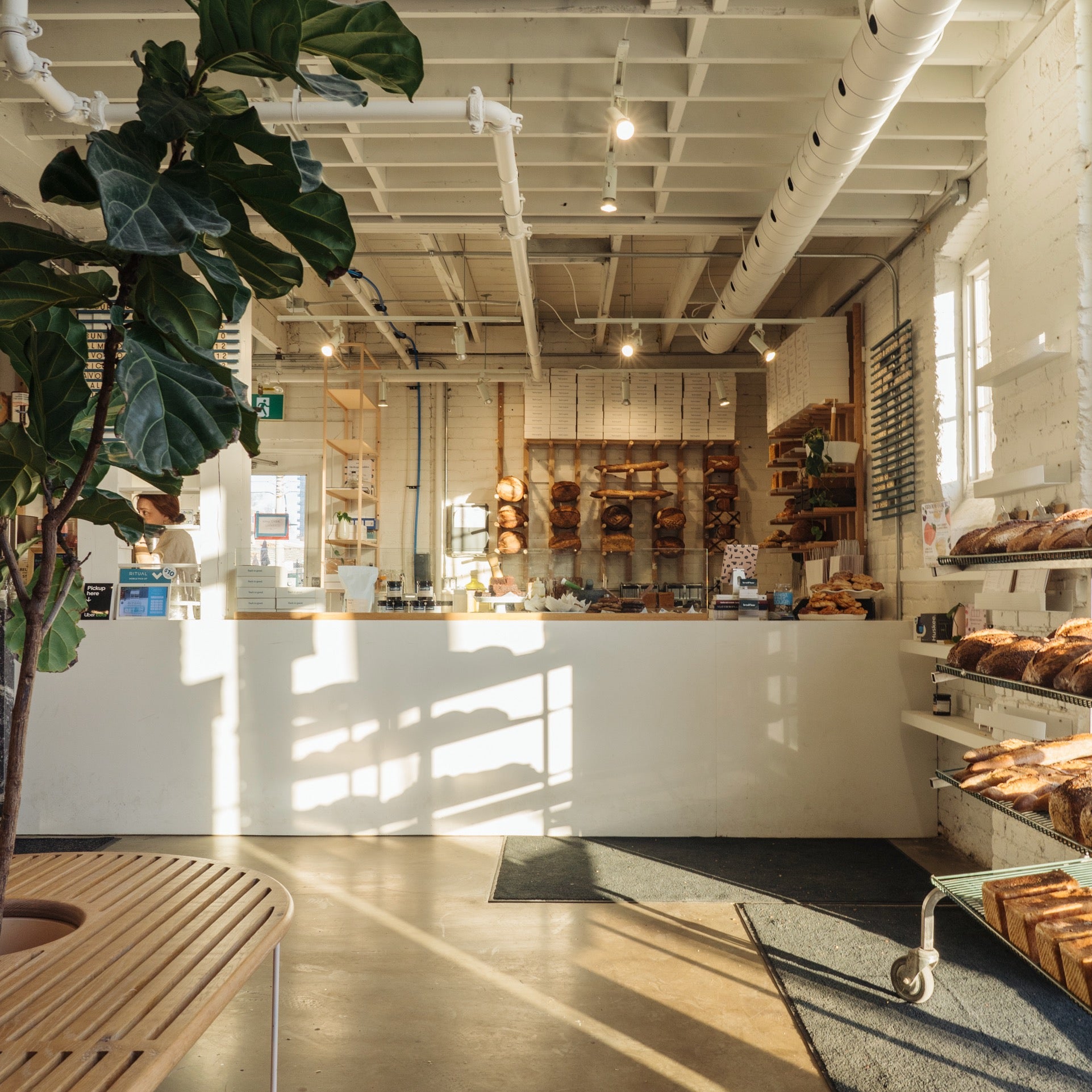
Brodflour, a bakery and café in Toronto, has pivoted its services to delivery only and started an online store selling its freshly milled heritage grain flours.Anthony Menecola
As the effects of COVID-19 continue to impact the hospitality industry, Brodflour has made many changes, from adjusting its in-house service to fully closing down the café to offering only packaged items through delivery services. Now, it’s starting an欧宝体育官网入口首页to sell its flours and jams.
While Brodflour’s sales previously came from in-house purchases of meals, baked goods, and coffee, its current main source of income is flour. “What we would sell in a month for flour, we are selling in two days,” says Matthew, “and that’s not including our wholesale customers.”
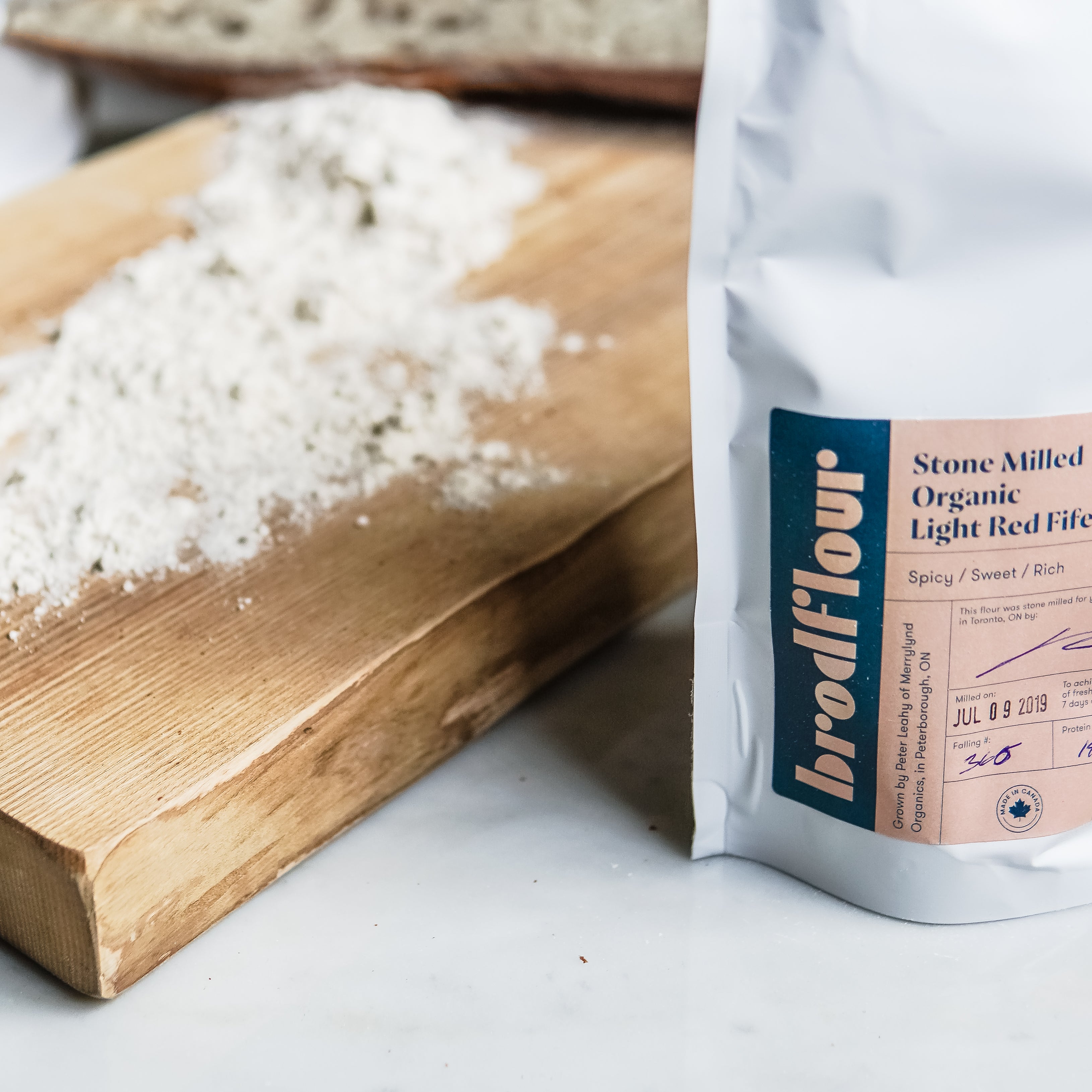
As baking became a popular quarantine activity and regular grocery stores began experiencing a shortage of flour, some have turned to Brodflour to offer an alternative premium product. Brodflour has even teamed up withGreenhouse Juice Co.to deliver its flour to the Greater Toronto Area.
Much like its grains, Brodflour’s growth was organic. “We haven’t done any additional advertising outside of what we typically do on our social media,” says Matthew. “We’re just trying to use our social media channels to interact with our clients.” The team is using its platform to share updates on its service changes, educating customers on the differences between types of flours, and recipes for their community's favorite baked items. The consistent connection with customers has allowed Broadflour to be discovered by new wholesale partners while growing relationships within its community.
Physical distancing while remaining socially close
Even though the current outbreak has created a new set of unknowns, businesses and individuals have taken on challenges and found new ways to pivot and grow—fromresponding with compassiontomigrating from offline to onlinetoadjust logistics to meet new sets of limitations. We’re inspired by all these businesses to keep finding new ways to work together while working at a distance.
Illustration by Luca D'Urbino

